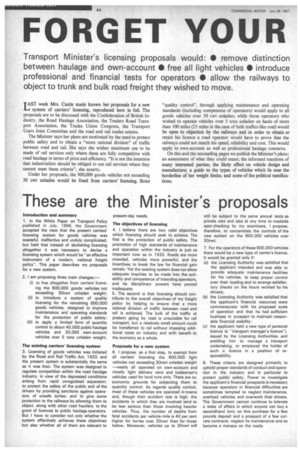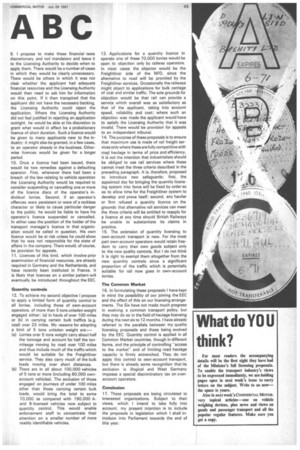FORGET YOUR ABC
Page 46

Page 47

If you've noticed an error in this article please click here to report it so we can fix it.
Transport Minister's licensing proposals would: • remove distinction between haulage and own-account • free all light vehicles • introduce professional and financial tests for operators • allow the railways to object to trunk and bulk road freight they wished to move.
T AST week Mrs. Castle made known her proposals for a new 1-i system of carriers' licensing, reproduced here in full. The proposals are to be discussed with the Confederation of British Industry, the Road Haulage Association, the Traders Road Transport Association, the Trades Union Congress, the Transport Users Joint Committee and the road and rail trades unions.
The Minister says her plans are motivated by the need to protect public safety and to obtain a -more rational division" of traffic between road and rail. She says she wishes maximum use to be made of rail services only where these are fully competitive with road haulage in terms of price and efficiency. "It is not the intention that industrialists should be obliged to use rail services where they cannot meet these criteria", she asserts.
Under her proposals, the 900,000 goods vehicles not exceeding 30 cwt unladen would be freed from carriers' licensing. Strict "quality control", through applying maintenance and operating standards (including competence of operators) would apply to all goods vehicles over 30 cwt unladen; while those operators who wished to operate vehicles over 5 tons unladen on hauls of more than 100 miles (25 miles in the case of bulk traffics like coal) would be open to objection by the railways and in order to obtain or retain his licence a road operator would have to prove that the railways could not match his speed, reliability and cost. This would apply to own-account as well as professional haulage concerns.
On this and the succeeding pages we publish the Minister's plans; an assessment of what they could mean; the informed reactions of many interested parties; the likely effect on vehicle design and manufacture; a guide to the types of vehicles which lie near the borderline of her weight limits; and some of the political ramifications.
9. I propose to make these financial tests discretionary and notmandatory and leave it to the Licensing Authority to decide when to apply them. There would be a number of cases in which they would be clearly unnecessary. There would be others in which it was not clear whether the applicant had adequate financial resources and the Licensing Authority would then need to ask him for information on this point. If it then transpired that the applicant did not have the necessary backing, the Licensing Authority could reject the application. Where the Licensing Authority did not feel justified in rejecting an application outright, he would be able at his discretion to grant what would in effect be a probationary licence of short duration. Such a licence would be given to many applicants new to the industry; it might also be granted, in a few cases, to an operator already in the business. Otherwise licences would be given for a longer period.
10. Once a licence had been issued, there would be two remedies against a defaulting operator. First, whenever there had been a breach of the law relating to vehicle operation the Licensing Authority would be required to consider suspending or cancelling one or more of the licence discs of the operator's individual lorries. Second, if an operator's offences were persistent or were of a reckless character or likely to cause particular danger to the public, he would be liable to have his operator's licence suspended or cancelled. In either case the position of the holder of the transport manager's licence in that organization would be called in question. His own licence would be at risk unless he could show that he was not responsible for the state of affairs in the company. There would, of course, be provision for appeals.
11. Licences of this kind, which involve prior examination of financial resources, are already required in Germany and the Netherlands, and have recently been instituted in France. It is likely that licences on a similar pattern will eventually be introduced throughout the EEC.
Quantity controls
12. To achieve my second objective I propose to apply a limited form of quantity control to all lorries, including those of own-account operators, of more than 5 tons unladen weight engaged either: (a) in hauls of over 100 miles or (b) in carrying certain bulk traffics (e.g.
coal) over 26 miles. My reasons for adopting
a limit of 5 tons unladen weight are:— Lorries over 5 tons weight carry about half the tonnage and account for half the tonmileage moving by road over 100 miles and thus include much of the traffic which would be suitable for the Freightliner service. They also carry much. of the bulk loads moving over short distances.
(13) There are in all about 100,000 vehicles of 5 tons or more (including 60,000 ownaccount vehicles). The exclusion of those engaged on journeys of under 100 miles other than those carrying certain bulk loads, would bring the total to some 70,000 as compared with 190,000 Aand B-licensed vehicles now subject to quantity control. This would enable enforcement staff to concentrate their attention on a smaller number of more readily identifiable vehicles.
13. Applications for a quantity licence to operate one of these 70,000 lorries would be open to objection only by railway operators. In most cases the objector would be the Freightliner side of the NFO, since the alternative to road will be provided by the Freightliner services. Occasionally the railways might object to applications for bulk carriage of coal and similar traffic. The sole grounds for objection would be that rail can provide a service which overall was as satisfactory as that of the applicant, taking into account speed, reliability and cost; where such an objection was made the applicant would have to satisfy the Licensing Authority that it was invalid. There would be provisiori for appeals to an independent tribunal.
14. The purpose of these proposals is to ensure that maximum use is made of rail freight services only where these are fully competitive with road haulage in terms of price and efficiency. It is not the intention that industrialists should be obliged to use rail services where these cannot meet the three criteria described in the preceding paragraph. It is, therefore, proposed to introduce two safeguards: first, the appointed day for bringing the quantity licensing system into force will be fixed by order so as to allow time for the Freightliner system to develop and prove itself: second, any haulier or firm refused a quantity licence on the grounds that alternative rail services can meet the three criteria will be entitled to reapply for a licence at any time should British Railways be unable to substantiate its claims in practice.
15. The extension of quantity licensing to own-account transport is new. For the most part own-account operators would retain freedom to carry their own goods subject only to the new quality controls. But I do not think it is right to exempt them altogether from the new quantity controls since a significant proportion of the traffic which is potentially suitable for rail now goes in own-account lorries.
The Common Market
16. In formulating these proposals I have kept in mind the possibility of our joining the EEC and the effect of this on our licensing arrangements. The Six have not made much progress in evolving a common transport policy, but they may do so in the field of haulage licensing during the next six to 12 months. I have already referred to the parallels between my quality licensing proposals and those being evolved by the EEC. Quantity control is applied in all Common Market countries, though in different forms, and the principle of controlling -access to the market" and of limiting road haulage capacity is firmly entrenched. They do not apply this control to own-account transport, but there is already some recognition that its exclusion is illogical and West Germany imposes a special discriminatory tax on ownaccount operators.
Conclusion
17. These proposals are being circulated to interested organizations. Subject to their views, which I intend to take fully into account, my present intention is to include the proposals in legislation which I shall introduce into Parliament towards the end of this year.




































































































































































